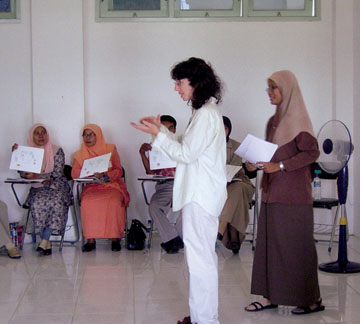People and Context
Lisa Smulyan ’76 loves to put them together.
Professor of Educational Studies and Associate Provost Lisa Smulyan ’76 has always been interested in teaching as one way of addressing issues of inequity. Growing up in Syracuse, N.Y., she attended a public high school where black students were bussed to a predominantly white school; assemblies and dances were prohibited to prevent students from gathering in groups; and faculty and staff never once raised with students questions about race, education, and their own school environment. It was an environment that raised a lot of questions about teaching, schooling, and social change. As a teenager, she worked with children from underserved communities in a Head Start program in New York State and coordinated summer programs and camps in Syracuse.
As a student at Swarthmore, Smulyan participated in the Honors Program as a history major with an English literature minor. It wasn’t until her senior year that her thoughts returned to the possibility of teaching. After graduation, she pursued a one-year master’s program at Brown University to obtain certification, taught seventh-through-12th–grade English and social studies in Massachussetts public schools, and worked with graduate students at Brown’s M.A.T. Program and at the University of New Hampshire. Along the way, she obtained an Ed.D. from Harvard’s Graduate School of Education.
In 1985, she returned to her alma mater. Her research and teaching interests include exploring ways in which educational institutions can contribute to and challenge existing social constructs and power relationships.
Smulyan is married to Michael Markowicz and is the mother of two children, Ben Smulyan, 21; and Amanda Markowicz, 18.
Do you have a recipe for good teaching?
I spend my life thinking about this. I do believe that people can learn to be teachers. Good teaching is a combination of learned skills, the individual person, and the context within which he or she is teaching. It’s really hard to create a one-size-fits-all definition.

Smulyan’s interest in teaching in different cultures was aroused during relief work in Banda Aceh, where she helped train new teachers after 6,000 were lost to the 2004 tsunami.
What brought you back to Swarthmore?
I was teaching in a public high school and looking for another job, and Eva Travers [Professor Emerita of Educational Studies] called and offered me a three-year leave-replacement position. I had also been offered a tenure-track job in the Education Department at Connecticut College. I turned Connecticut down to come to Swarthmore for the temporary appointment. I was still unsure if I wanted to work in a college or university, but I decided that if I was going to try it out, I’d rather try it here than anywhere else.
Did you ever dream of doing something different?
A part of me has always wanted to be a dancer. I grew up attending summer performances of the New York City Ballet in Saratoga. My parents liked dance, so my mother saved S&H Green Stamps to pay for tickets for the whole family to attend the ballet every summer. I’ve always been completely awed by dancers and what they can do.

An accomplished French horn player throughout her high school years, Smulyan played in a brass quintet and performed with the Syracuse Symphony Youth Orchestra. While at Swarthmore, she played in various College chamber groups and with the Youth Orchestra of Greater Philadelphia.
If you could have a plane ticket to anywhere, where would you go?
I’d need an open ticket with multiple stops. After the tsunami in Southeast Asia, I went to Aceh, Indonesia, to do relief work with an NGO. We helped with teacher training after Aceh lost 6,000 teachers to the tsunami. That got me interested in teachers, teaching, and schooling in different places and cultures. Since then, I’ve spent two years developing a course in comparative education. I’ve traveled to China, Costa Rica, South Africa, and Italy to look at education in those specific contexts. I have a long list of places I want to go, but I’d really like to spend some time in a place where I can become part of a teaching and learning community. I’m thinking about Sri Lanka. Teaching in post-conflict areas raises some of the most complicated questions about the role of education in a society—what people’s relationships are to each other and how education facilitates, or inhibits, their interactions and opportunities to grow and change.
Do you have a favorite place in your house? I have a chair in my study that’s just for me. Growing up, I had a stuffed rocking chair in my bedroom. I read, studied, prepared classes in it. It went with me everywhere, to my dorm room here—I have memories of reading Shakespeare in that chair in my senior year—to my apartments in Providence and Boston, and my home in Swarthmore. Wherever I was, that chair was “my spot.” It was reupholstered twice, but last year, it died. Now, I have a replacement chair. It’s different, but it’s still my place to read and work.
What makes you feel euphoric?
The feeling of satisfaction I get when I come out of a stimulating class or seminar. Watching one of my children doing something that they really love. Watching Barack Obama win the election.
How would you describe where you live and work?
I feel very supported. I could do none of the things I do by myself. Being able to do my job and be a parent too are the results of other people providing an environment within which that can happen. It’s the people and the contexts within which I live and work that enable me to do what I do.
 Email This Page
Email This Page
